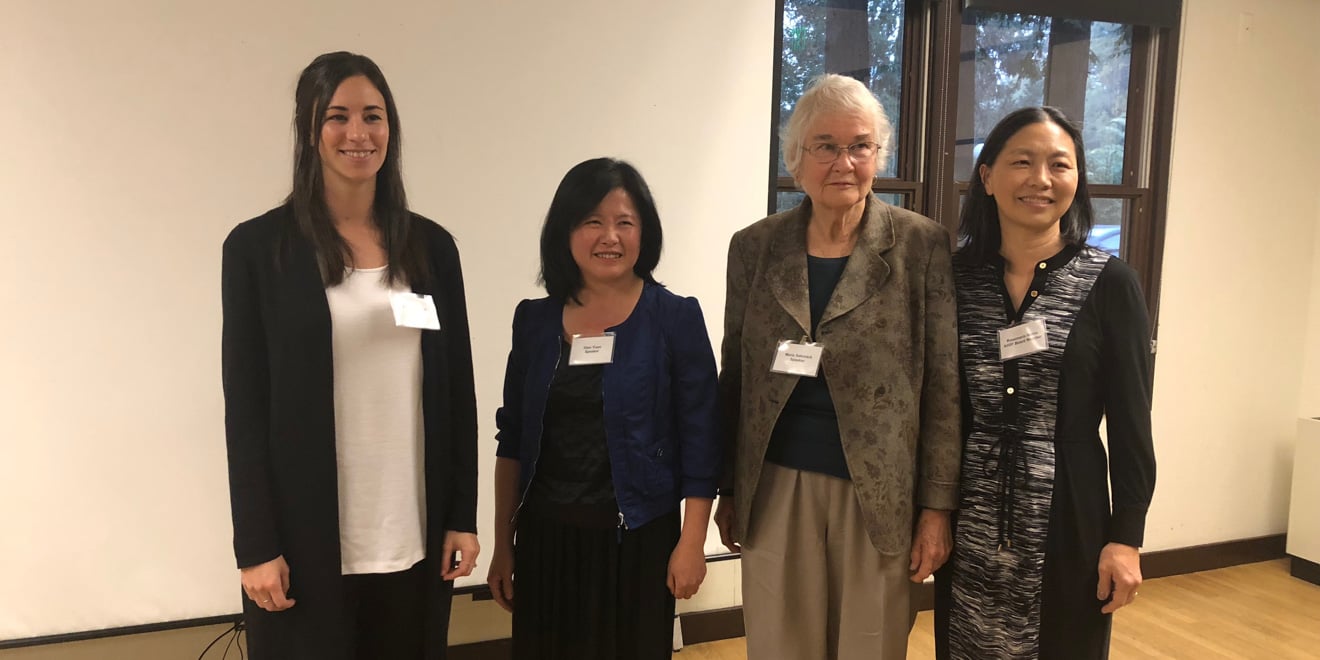On Thursday, a group of speakers who are involved in or have experienced immigration firsthand discussed personal stories and policy issues related to refugees and asylum seekers. Topics at the event, titled “Refugees and Asylum Seekers: From Angel Island to Now,” included paying off pirates, comforting refugees of the 1917 Russian Revolution and fleeing Nazi-occupied Austria as a Jew.
The Stanford Asian American Student Association partnered with the Angel Island Immigration Station Foundation (AIISF) to host the event. Speakers said they offered accounts of their own histories in hopes of fostering respectful conversation regarding the current plight of refugees who seek asylum in the United States.
“Our goal today is to connect the dots between the history of refugees at Angel Island to the refugees and asylum seekers today,” said AIISF board member Rosmarie Namh. “Today we rely too much on political soundbites and headlines and not enough on facts.”
Speaker Heather Klein, who did not personally immigrate to the United States, expressed a deep-seated desire to learn about the journey of her grandmother, Rosa Ginsburg, who immigrated from Nazi-occupied Austria.
“I knew that she made really great Hungarian goulash, that she smoked a lot of cigarettes, that she really loved her family, that she escaped World War II and made it to the United States,” Klein explained in a prerecorded video clip shown at Thursday’s event.
She added that, upon finding Ginsburg’s name in an article online, she was motivated to visit Angel Island and recreate the journey that her grandmother underwent. Ginsburg was betrayed by her lifelong neighbors, who reported her Jewish family to the authorities. She and her family fled to Shanghai, but she alone made the long journey across the Pacific to the United States, where she was detained at Angel Island for three weeks.
After falsely claiming — and maintaining throughout intense questioning — that she was engaged to a man she had known in high school, Ginsburg was released from Angel Island. She traveled to New York and found the man to whom she had claimed to be engaged — Herbert Klein, Heather’s grandfather.
Speaker Maria Sakovich, whose grandfather was a Russian orthodox priest, recalled eagerly — and unsuccessfully — scanning government documents for her grandfather’s name. Sakovich frequently visited Angel Island in remembrance of the heartsick and confused refugees who had fled there to escape the Russian Revolution. But Klein noted that information about the past is hard to find, and she still can’t find legal information about her grandfather. She said she has no idea how her grandmother made it to Shanghai.
Speaker Dien Yuen, who traveled in a boat from Vietnam in the 1970s, said she also finds it difficult to learn about her relatives’ past.
“It’s really hard to get the stories out from them,” she said. “I’m sure it was quite tragic. Nobody wants to talk about it. I know there’s been a lot of issues and a couple of deaths in the family.”
Yuen recalled a turbulent transition from life in Vietnam, which included paying off pirates, cramming for the U.S. citizenship test and then navigating life — from the “Chinese world” in her house to the “American home” outside — in the United States. Despite past hardship, Yuen smiled and joked throughout her story. She laughed, describing how she had to “guard the rice” during the boat trip to America, and she later quipped that she and her five siblings were “free labor” for her father’s Chinese restaurant.
To add a policy-based element to the event, AIISF hosted Faye Hipsman, a policy analyst at the U.S. Immigration Policy Program. Hipsman recently coauthored a report titled “The U.S. Asylum System in Crisis: Charting a Way Forward,” in which breakdowns of the immigration system are addressed with solutions proposed.
She presented figures on the state of the U.S. immigration system and touched on policies of the Trump administration, saying, “We [Hipsman and her coauthors] argue that these steps [by the Trump administration] have been unnecessarily harsh and basically that there’s another way forward to fixing the asylum system.”
Namh said AIISF hopes to continue hosting events such as Thursday’s, as the organization believes issues facing refugees and asylum seekers are extremely relevant to today’s political climate. She added that the organization wants its events to motivate more informed discussion among students.
“The facts speak for themselves,” Namh said. “We are not going to debate these policies. We hope you will do that at your dinner tables and in your dorms.”
Contact Anushree Thekkedath at anuthekk ‘at’ stanford.edu.
